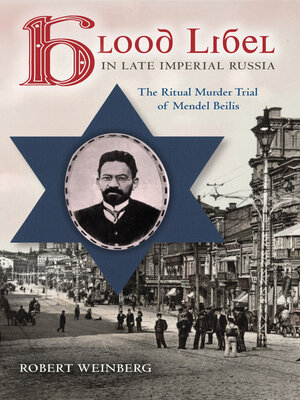Blood Libel in Late Imperial Russia
ebook ∣ The Ritual Murder Trial of Mendel Beilis
By Robert Weinberg

Sign up to save your library
With an OverDrive account, you can save your favorite libraries for at-a-glance information about availability. Find out more about OverDrive accounts.
Find this title in Libby, the library reading app by OverDrive.



Search for a digital library with this title
Title found at these libraries:
| Library Name | Distance |
|---|---|
| Loading... |
This "riveting history . . . brings us face to face with this notorious trial" of a Russian Jew who was framed for ritual murder in 1913 (Jewish Book World).
On Sunday, March 20, 1911, children playing in a cave near Kiev made a gruesome discovery: the blood-soaked body of a partially clad boy. After right-wing groups asserted that the killing was a ritual murder, the police, with no direct evidence, arrested Menachem Mendel Beilis, a thirty-nine-year-old Jewish manager at a factory near the site of the crime. Beilis's trial in 1913 quickly became an international cause célèbre.
The jury ultimately acquitted Beilis but held that the crime had the hallmarks of a ritual murder. Robert Weinberg's account of the Beilis Affair explores the reasons why the tsarist government framed Beilis, shedding light on the excesses of antisemitism in late Imperial Russia. It is a gripping narrative culled from trial transcripts, newspaper articles, Beilis's memoirs, and archival sources, many appearing in English for the first time.
On Sunday, March 20, 1911, children playing in a cave near Kiev made a gruesome discovery: the blood-soaked body of a partially clad boy. After right-wing groups asserted that the killing was a ritual murder, the police, with no direct evidence, arrested Menachem Mendel Beilis, a thirty-nine-year-old Jewish manager at a factory near the site of the crime. Beilis's trial in 1913 quickly became an international cause célèbre.
The jury ultimately acquitted Beilis but held that the crime had the hallmarks of a ritual murder. Robert Weinberg's account of the Beilis Affair explores the reasons why the tsarist government framed Beilis, shedding light on the excesses of antisemitism in late Imperial Russia. It is a gripping narrative culled from trial transcripts, newspaper articles, Beilis's memoirs, and archival sources, many appearing in English for the first time.







